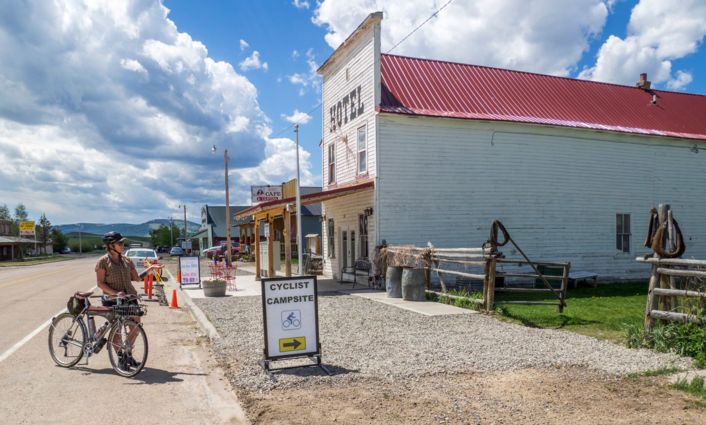
Adventure Cycling route maps list what we call “Cyclists Only Lodging”– accommodations along bicycle touring routes or long-distance trails with basic bicycle amenities that are only available to the traveling cyclist. They are generally promoted through our map listings or word of mouth. The types of accommodations vary greatly, including camping areas, ranches, hostels, churches or community centers, and most are free or charge a small fee. They create a lasting impression on touring cyclists, since few accommodations cater directly to them, and word spreads quickly in the cycling community.
Examples
Bicycle Camping
- Twin Bridges, Montana
- Ovando, Montana
- Adventure Camp, Anaconda, Montana
- Bike Walk Southwest Montana Camp, Dillon
- Barn Bicycle Camping, Methow Valley, Washington
- Chester, Illinois
- London, Ohio
- Perry County, Kentucky
- Monroeville Community Center, Indiana
- Marion United Methodist Church, Kentucky
Bike Lodging
- Spoke’n Hostel in Mitchell, Oregon
- Al’s Place Hostel in Farmington, Missouri
- Bicycle Bunkhouse in Dalbo, Minnesota
Hospitality Exchange
Bicycle Resorts
- Whitefish Bike Retreat in Whitefish, Montana
- The Bike Farm in Pisgah, North Carolina
- Mulberry Gap Mountain Bike Getaway in Ellijay, Georgia
Check out this Path Less Pedaled interview with Pat and Jalet Farrell, owners of Spoke’n Hostel.
Do’s and Don’ts
1. Build community support for the project before you start.
-
Communicate to key stakeholders the benefits of accommodating bicycle travelers.
- Be ready to address potential community fears and misinformation about touring cyclists. Providing information on touring cyclist demographics can help.
- Be aware of your messaging. For example, “biker” could bring to mind stereotypes of motorcycle gangs; “camp” could evoke stereotypes of homeless camps.
2. Keep it simple if you have limited resources.
- You can keep the initial investment small and maintenance requirements low by offering basic amenities for cyclists.
- Implement the How to be Bicycle Travel Friendly hospitality tips that make sense for your accommodations.
3. Consider your location.
- There needs to be demand, so your accommodations will be most successful along popular bicycle touring routes or long-distance trails.
- It should be close enough to services to walk or bike (less than 1-2 miles), or close to public transportation access.
4. Communicate expectations.
- Know your philosophy on hosting etiquette, and let your guests know what your expectations are.
- Be clear on your rules, but be wary that posting too many signs can come across as overbearing.
5. Promote your accommodations to the cycling community.
- Create a website and social media handles and connect with cyclists through social media.
- If it’s along an Adventure Cycling route, request to list it on our maps.
- If it’s a free accommodation, you could create a WarmShowers.org listing.
- Submit a guest blog post to Adventure Cycling, and request to share it on Bike Bits.
6. Reach out to the business community.
- Promote local businesses by providing a listing of local services to visiting bicyclists.
- Ask businesses and tourism agencies to let bicyclist visitors know about your accommodations, and drop off brochures or flyers if you have them.
- Estimate bicycle tourism spending at local businesses through a survey after the bicycle touring season is over so you can show real benefits.